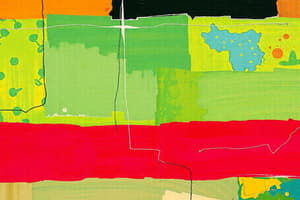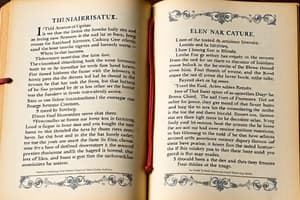Podcast
Questions and Answers
Which of the following genres did NOT experience significant evolution during the Renaissance period?
Which of the following genres did NOT experience significant evolution during the Renaissance period?
- Novel (correct)
- Poetry
- Drama
- Humanist writings
Which of the following writers is NOT mentioned as an influential figure during the Renaissance?
Which of the following writers is NOT mentioned as an influential figure during the Renaissance?
- John Milton (correct)
- Edmund Spenser
- Christopher Marlowe
- William Shakespeare
What was a significant influence on Renaissance writers like Shakespeare and Marlowe?
What was a significant influence on Renaissance writers like Shakespeare and Marlowe?
- The Romantic movement
- The scientific revolution
- The industrial revolution
- The classical humanist curriculum (correct)
Which of the following statements about Renaissance drama is accurate?
Which of the following statements about Renaissance drama is accurate?
What was a significant factor that contributed to the rise of humanist writings during the Renaissance?
What was a significant factor that contributed to the rise of humanist writings during the Renaissance?
Which of the following statements about Renaissance literature is NOT accurate?
Which of the following statements about Renaissance literature is NOT accurate?
Which renowned poets contributed significantly to the development of sonnet forms and other lyric traditions during the Renaissance?
Which renowned poets contributed significantly to the development of sonnet forms and other lyric traditions during the Renaissance?
What did Montaigne's "Essais" showcase?
What did Montaigne's "Essais" showcase?
Why is William Shakespeare often regarded as England's greatest playwright?
Why is William Shakespeare often regarded as England's greatest playwright?
What was Francis Bacon's role in the Renaissance literary scene?
What was Francis Bacon's role in the Renaissance literary scene?
How did John Milton's portrayal of Satan in "Paradise Lost" influence literature?
How did John Milton's portrayal of Satan in "Paradise Lost" influence literature?
Flashcards are hidden until you start studying
Study Notes
Renaissance Literature
Introduction
The Renaissance period, spanning from the 14th to the 17th centuries, marked a significant shift in the literary landscape of Europe. With the resurgence of classical learning and an increased focus on individualism, scholars began to explore new ways of expressing ideas and emotions. In this article, we delve into the various subtopics of Renaissance literature, exploring the evolution of genres, influential writers, and the impact of the era on the broader literary tradition.
Evolution of Genres
During the Renaissance, several literary genres emerged and evolved, reflecting the changing perspectives of society. Some notable developments included:
-
Humanist Writings: Encouraged by the growing availability of humanistic education, writers like William Shakespeare, Christopher Marlowe, Edmund Spenser, Ben Jonson, and Francis Bacon were deeply influenced by the classical humanist curriculum. Their works frequently referenced the ancient Greeks and Romans, demonstrating the influence of the era's educational focus.
-
Drama: Both stage and domestic dramas saw a surge in popularity. Shakespeare's plays, for instance, were groundbreaking in their exploration of human emotion and societal structures. His work, like many others from the period, challenged traditional norms and offered fresh perspectives on life and human relationships.
-
Poetry: Renowned poets such as Petrarch and Giovanni Boccaccio contributed significantly to the development of sonnet forms and other lyric traditions. Their works focused on the complexities of human nature, love, and personal experiences, setting the stage for later poets like John Milton and William Wordsworth.
-
Essays and Prose: Texts like Montaigne's "Essais," or essays, showcased the writer's insights into the human condition. These pieces often explored moral issues, personal reflections, and current events, providing readers with unique perspectives and analyses.
Influential Writers
Several figures stood out as pioneers of the Renaissance literary scene, their works continuing to inspire and influence contemporary literature. Among them were:
-
William Shakespeare: Often regarded as England's greatest playwright, Shakespeare's contributions to drama remain unparalleled. His plays, such as "Hamlet," "Macbeth," and "Othello," continue to captivate audiences and critics alike.
-
Francis Bacon: As a philosopher and statesman, Bacon is considered one of the founding figures of the scientific method. His essays, including "Of Studies," showcased his progressive views on education and laid the groundwork for empirical philosophies.
-
John Milton: Known primarily for his epic poem "Paradise Lost," Milton's work demonstrated a deep understanding of human nature and the divine. His portrayal of Satan as a sympathetic figure paved the way for more nuanced depictions of villains in literature.
-
Ben Jonson: A peer of Shakespeare, Jonson contributed to various literary genres, including comedy and satire. His plays like "Volpone" and "Every Man Out of His Humour" offer biting commentary on human behavior and societal conventions.
Conclusion
While the Renaissance lasted several centuries, its impact on literature continues to reverberate through the ages. The era's renewed focus on humanism, classical learning, and artistic expression set the stage for countless innovations and developments in literature. As we continue to explore the depths of these timeless works, we find ourselves enriched by the wisdom and insight they impart.
Studying That Suits You
Use AI to generate personalized quizzes and flashcards to suit your learning preferences.





